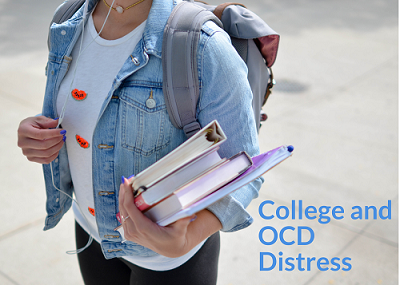Going Away to College Can Lead to an Uptick in OCD Distress
March 6, 2020This post originally appeared on the website of the Anxiety and Depression Association of America

The onset of OCD typically occurs during adolescence, with 25% of cases starting by age 14. Because teens typically live at home, accommodations by family members are common. Accommodations occur when others attempt to aid sufferers by assisting in rituals. However, doing so fuels OCD, potentially worsening symptoms and impairing the overall functioning of the family. Such accommodations can include buying cleaning supplies, washing clothes, serving “safe” foods, changing the family’s schedule, driving a specific route to school, designating a specific bathroom for only the sufferer, or simply offering reassurance. Because of loved ones’ well-intended accommodations – especially by parents – adolescents might not experience the full impact of their OCD symptoms.
However, when teens make the transition to college and move into residence halls, many of these accommodations disappear, leaving OCD’s rituals to be carried out almost entirely by the sufferer. This spike in rituals, especially physical compulsions, is often time-consuming and raises the teen’s level of distress. Unlike understanding and accommodating parents, roommates often become frustrated and angry, not at OCD but at the sufferer – and their unwillingness to adhere to OCD’s rules (regardless of whether they know their roommate has OCD or just think the person is “weird”) creates even more distress for the OCD sufferer.
College is full of new stimuli and stressors for any student, including learning independent time management, being away from familiar spaces, and adapting to new expectations. These changes in addition to OCD’s demands can be exceptionally overwhelming. And because it’s common for OCD to jump around themes, the new environment, schedule, community, and routine offer many new areas for OCD to attack.
However, to prepare for this transition, there are steps parents and teens themselves can take. Possibly the most impactful is for parents to reduce their accommodations (with the goal of eliminating them entirely) and teens to take on more responsibility for independently carrying out their rituals (with the goal of not doing them at all) while the teen still lives at home. In the short run, this is likely to cause more stress, anxiety, anger, and disruption – not only for the teen, but for the entire family. While still living at home, however, the sufferer has the built-in support system of the family. Facing the reality of how cumbersome rituals can be will potentially motivate sufferers to seek treatment and address OCD.
Once away at school, the new college student will no longer see family members daily and the execution of their support will change. When the student lived at home, parents could monitor behaviors and step in when necessary, such as when teens engage in dangerous rituals or becomes despondent. After college starts, parents must rely on self-reporting from their child about the status and severity of OCD symptoms, rather than direct observation. Because OCD thoughts and rituals often result guilt and shame, and many OCD sufferers are hyper-focused on how much of a perceived burden they place on those around them, suffering in silence is common. This amplifies the need for observation. By making changes prior to the start of college, family members have the opportunity to encourage their teen to use their problem-solving skills, ERP training, and curiosity to navigate confronting OCD and work toward living an OCD-free life.
